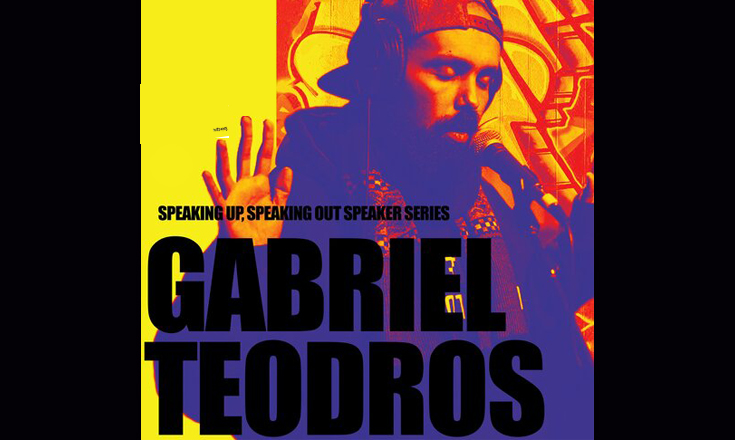In Broadway Edison room 1110 on Wednesday, November 6th community members will have the opportunity to experience the first installment in Seattle Central’s Speaking Up, Speaking Out series, featuring DJ and community organizer Gabriel Teodros.
Gabriel Teodros is a member of the collectives of Abyssinian Creole and CopperWire and a DJ for KEXP. Teodros has been a long time advocate and driving force in the Seattle Hip Hop and R&B scene since the mid 90’s. Teodros and I took some time together to talk about his music, the importance of community, and cultural issues in art.
——————————————————————————————
HR: First off, what is your name and title at KEXP- as well as all of the other collective groups you are a part of?
GT: Gabriel Teodros of Abyssinian Creole and CopperWire. Also a DJ on KEXP.
HR: How long have you been involved with KEXP, and how did you start working there?
GT: KEXP was one of the first stations to regularly play my music, and we’ve done events together dating back to around 2005. The first time I ever hosted a show on KEXP was as a guest host for Street Sounds in late 2006, on a night B-Mello was out of the station. I used to DJ on another radio station (KBCS) from 2005 until 2008. In the spring of 2017, I really missed doing a weekly show and was thinking about how to honor Jonathan Moore, a mentor to a lot of us in the Seattle Hip-Hop community who passed away that year. I asked myself “What would Jon do?” if I wanted to do something more with radio. I knew he would build on his relationships to make a positive impact for the culture. I didn’t want to stay stuck in one genre, and I couldn’t imagine DJ’ing anywhere else in Seattle… so I reached out to the folks I knew at KEXP and asked what it would take. Within a few months that conversation led to a regular show. I’ve now been DJ’ing on KEXP pretty much every week since July of 2017.
HR: How did you start making music, and why?
I started making music when I was in high school, in the mid to late ’90s. Hip-Hop was always that best friend growing up, that voice that let me know I wasn’t alone. I started writing rhymes and sharing them first with just a few close friends, and then later at park jams, which led to countless freestyle sessions where I met people that I would end up making music with for the rest of my life. Some of those freestyle sessions happened at Seattle Central. Music gave me a sense of purpose and connection, it gave me family, a community, and it continues to give me hope even in the darkest times.
HR: Do you consider yourself more of a poet or a musician?
I consider myself a musician and a writer. Sometimes I write poetry, but I also write science-fiction stories, essays, articles… and I write songs more than anything else.
HR: In some of your more recent material you talk very directly about abuse and power dynamics. When did you decide to start including this in your lyricism, and was it related to an event, many events?
My 2007 album Lovework dealt with it too, as does a lot of my material since. Lovework was heavily influenced by Bell Hooks and her series on love, how she says to truly be loving we have to work to dismantle every system of domination, especially the ones we’ve grown up to internalize. That album, and all of my work in general, has been about redefining masculinity in ways that are anti-patriarchal. This most recent album History Rhymes If It Doesn’t Repeat (A Southend Healing Ritual) deals more with healing from trauma than anything I’ve written in the past. If you listen to the entire album as a story from beginning to end, it has a clear arc. The events that sparked it are in the lyrics. I was also heavily influenced by reading The Body Keeps the Score: Brain, Mind, and Body in the Healing of Trauma, a book written by Bessel van der Kolk, M.D.
HR: You also speak about many different types of social issues and imbalances. What role do you think art plays in revolution or creating change in a structural way?
I think art is a mirror in general, and at best it can mirror our potential, showing us other worlds are possible even if we haven’t experienced them yet. If you can describe the world you want to see in vivid detail, you are already helping it become a reality every time someone else can see what you see. Art can also bring people together around a unified cause, and it can help people see themselves in each other- even if it seems like on the surface they have nothing in common. I always tell younger artists our greatest secret superpower is that we can bring people together.
——————————————————————————————
The Wednesday November 6th event at 11am in BE 1110 will be free, all students and community members are encouraged to attend.







Be First to Comment